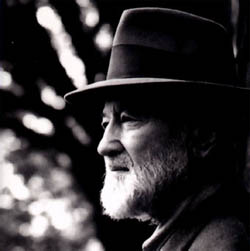Flagging Down Questions
AMERICANA THE BEAUTIFUL: Setting aside the increasingly slippery business of what defines patriotism, something jarring this way comes these days for anyone in the 1400 block of Anacapa Street. An epic-scaled American flag once again festoons the huge backside of the Lobero Theatre, timed for Independence Day, and begging even more questions than in its earlier appearance on this highly public wall.
America is in a bizarre transitional period, as we grapple with the world’s natural resentment toward us and the dimming of our hegemony as a world power. At a time when Dubya’s approval rating is at an all-time low, our emotional response to the flag-especially one so brash and brazen-may be mixed. This is a complex response shared by many proud Americans, of whatever partisan persuasion. (It really is time to get over the corrosive two-party, us-versus-them sensibility dividing America. I’m trading in my liberal card for a new membership in the nascent Neutralist party).
The Lobero’s jumbo flag display is mostly disturbing because of that great building’s legacy as a House of Culture. Whereas churches have historically been a haven for political sanctuary, culture has become a vital, secondary sanctuary. Similar issues of cultural-political dynamics arose last fall when the Santa Barbara Symphony followed its tradition of opening the season with its all-rise-for-the-national-anthem ritual. The situation seemed particularly strained because this was, by default, the first piece conducted by our new maestro, Nir Kabaretti. Music generally-and classical music, specifically-creates a place where multiple cultural identities coexist happily, and any hints of nationalism should be only implicit in composers’ scores.
All of which is to say, check out John Philip Sousa-the centerpiece of the Santa Barbara Symphony’s free-to-the-public July 4 concert, at 5 p.m. in the Courthouse Sunken Garden. Give this guy a break: Sousa was a brilliant composer/musical figure. A Sousa specialist, conductor Keith Brion, leads the symphonic charge.

Great American music is everywhere. It’s easy to sense national pride in our musical heritage. Take the Ojai Music Festival two weeks back (one of the best in many years). Of the musical highlights, many were of Hungarian origin-from Bart³k, Ligeti, and the wonderful living composer Peter Etvs. But we also got a transporting encounter with America’s greatest composer, Charles Ives, who was both a Sousa fan and an avant-garde visionary. What’s more American than a confusing hybrid of character traits? We’re still a young nation, after all, and haven’t found ourselves yet. And that’s a good thing.
At the festival’s Saturday morning concert, Ives’s masterful Concord Sonata was performed by the festival’s music director, the astonishingly good pianist Pierre-Laurent Aimard (who is French, adding again to the universality factor). Aimard has also recently released a recording of the sonata, which aptly prods and soothes.
ALL-AMERICAN FRINGE PRODUCTS: As part of SOhO’s enticing lineup of jazz shows coming up in the next few months (see story on page 63), trumpeter Christian Scott brings his cool funky-jazzy project to town. Scott is part of a new crop of venturesome trumpeters-including Nicholas Payton, Dave Douglas, and Nils Petter Molv:r-who are artfully mixing sounds and styles. Another trumpeter (well, cornetist) deftly working electro-acoustic junctures is Graham Haynes, son of the great jazz drummer Roy. Haynes the younger has been creating a new musical brew for years now, without enough attention being paid. His fascinating new album Full Circle (RKM) is less groove-y and more introspective and experimental, and includes music from Puccini’s Turandot (!).
Many musicians have paid tribute to the late, great Miles Davis, whose importance seems only to grow with time. Ron Carter-one-fifth of Davis’s superlative mid-’60s acoustic quintet (the best quintet in jazz history?)-has joined the ranks, with Dear Miles (Blue Note). Wisely, Carter excludes trumpet in a band featuring pianist Stephen Scott, and leans on Miles material from before his Miles tenure. Makes you proud to be an American.



